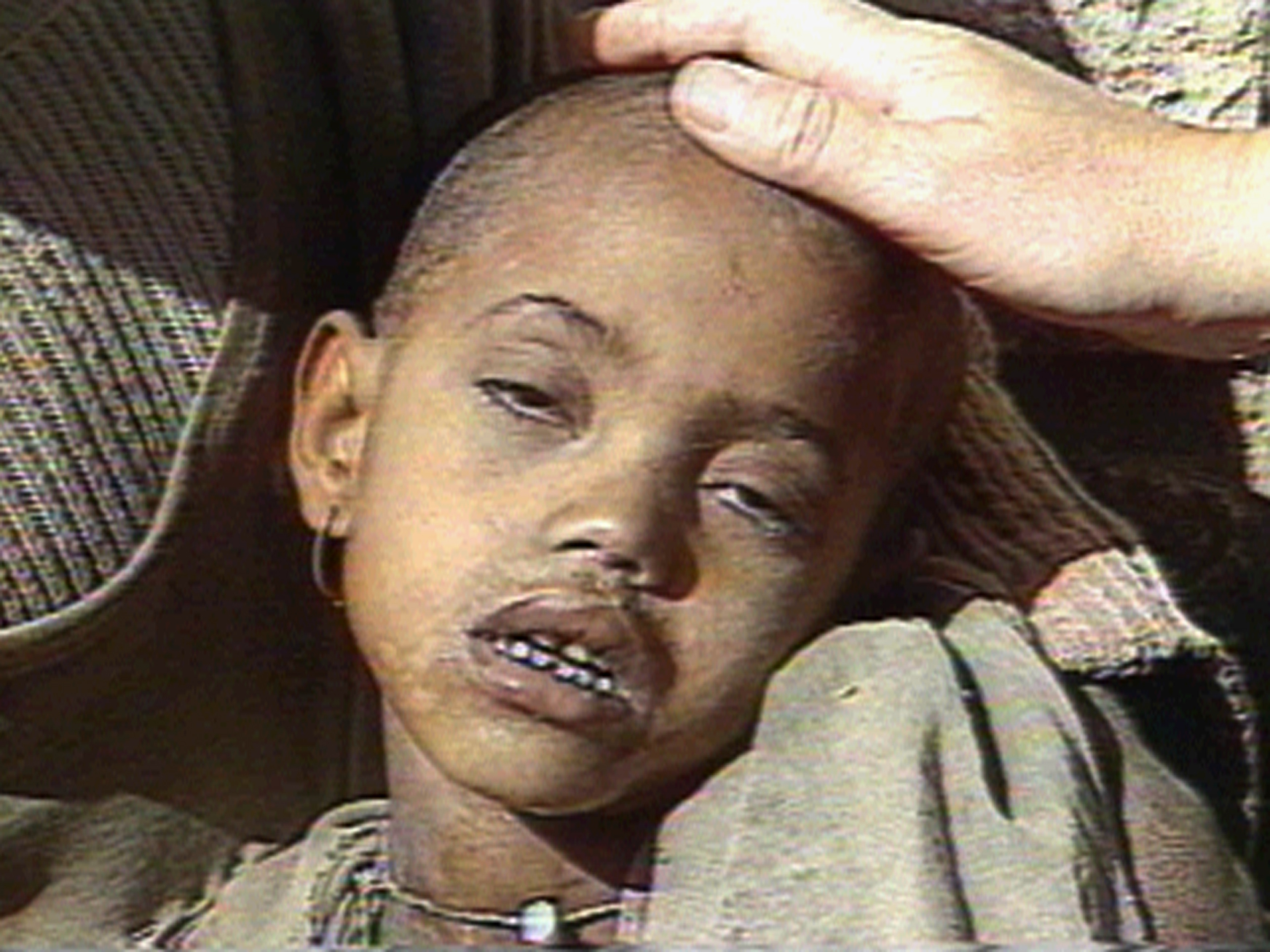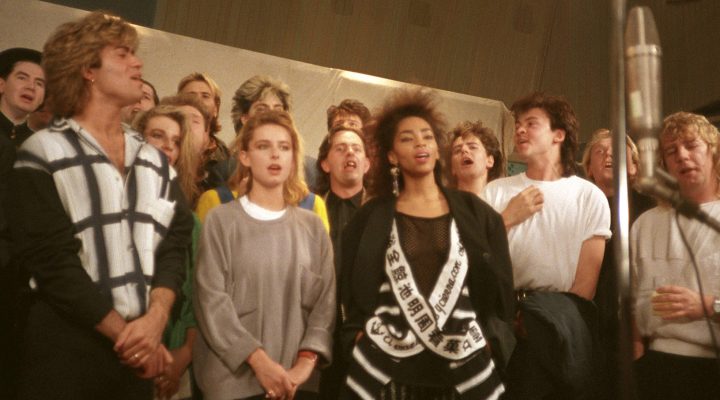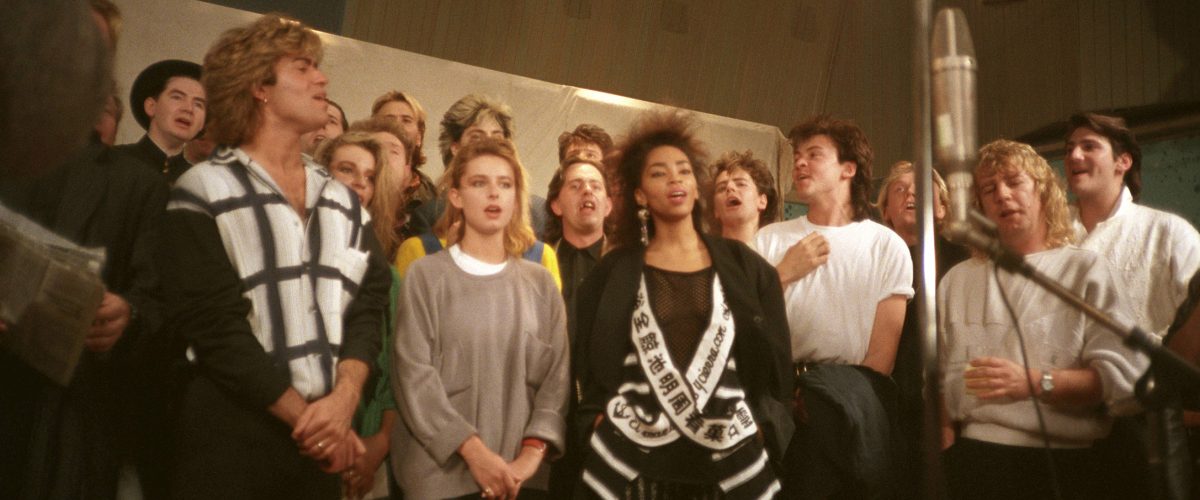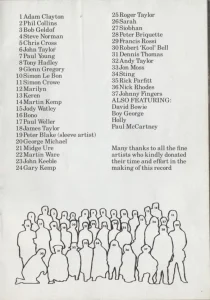When it comes to Christmas music, I prefer mine sacred and sung by an English university choir. I haven’t really been “into” popular Christmas music or pop stars’ Christmas records (sacred or secular) since I was a kid — with two big exceptions: Sarah McLachlan’s rendition of “In the Bleak Midwinter” and the original Band Aid recording of “Do They Know It’s Christmas?” which was released 40 years ago this month in December 1984.
As a child of the 1980s, the Band Aid record and Live Aid, the benefit concert it spawned, are indelible touch points on my life’s journey. I owe my fierce belief that we can (and should) strive to make the world a better place to Bob Geldof and Midge Ure’s example as much as I do to the prophetic leadership of Martin Luther King and the divine teachings of Jesus.
I love this song. I’ve loved it from the moment I first heard it. Once I learned the backstory, I loved it even more. To date, this “little pop song,” as Geldolf calls it, has raised approximately £150 million ($180 million US) for humanitarian aid in Ethiopia and other parts of Africa — all because Geldolf was moved by the suffering of others and asked himself, “What can I do?”

This is an image from television taken early November 1984 of Birhan Woldu after arriving at a relief station in Mekele, Ethiopia. When Birhan Woldu’s face haunted the 1984 Band Aid rock concert for famine relief, few knew her name. (AP Photo/Canadian Broadcasting Corporation)
Inspiration
If you aren’t familiar with Band Aid’s origins, here’s the story: It all began with the broadcast of a BBC News special report on the Ethiopian famine by Michael Buerk, which aired across the UK in late October 1984. The on-the-ground reporting brought vivid images of the suffering into British homes, humanizing what had been a distant, abstract tragedy.
Geldolf was one of the millions who tuned in that night and were profoundly affected by what they saw and heard. For him, the impossible position in which aid workers found themselves was as gut-wrenching as the plight of the starving women and children. Because the need exponentially dwarfed the available resources, each day Red Cross personnel such as Claire Bertschinger had to make literal life-and-death decisions about who would receive food and who would not.
Geldolf wanted to do something — something big. After ruminating for a few days, he decided he wanted to make a record to raise money and awareness. Through his girlfriend, the rock journalist and TV presenter Paula Yates, he got hold of Midge Ure, a songwriter, producer and multi-instrumentalist who then was lead singer of Ultravox, and pitched the idea to him.
Ure agreed to work with Geldof on the project. Originally, they thought about recruiting fellow pop musicians for a cover of a Christmas classic, but they soon realized the obligation to pay royalties would diminish the amount of money raised for the cause. So, they needed to compose a song themselves and quickly. If they were going to maximize sales, they needed to get their record out for the Christmas shopping season.
Ure got started on the tune, and Geldof sketched out the lyrics, working from the draft of an unfinished song he had intended for his band, the Boomtown Rats. Meanwhile, Geldof contacted a couple of big-name acts he knew. Once Sting, Duran Duran, and Spandau Ballet were on board, he knew others would want to be involved. Geldof also used media appearances to hype the Band Aid project even before the song was recorded.
On Nov. 25, 1984, the press descended upon Sarm West Studios in London as rock and pop royalty gathered to record their parts. The Daily Mirror (granted exclusive access inside the studio in exchange for front-page coverage) devoted most of the next day’s issue to photos and stories from the session. Record stores placed 250,000 advance orders. In its first week of release, “Do They Know It’s Christmas?” sold one million copies, more than all the other songs in the UK Top 10 combined. And because everyone involved — from the stars themselves to the engineers to the retailers to the factory workers who pressed the record and affixed the labels — donated their time and talent, almost every pence from every sale went to the Band Aid Trust. The UK government even donated back the tax.
Results
Within its first year, Band Aid raised £8 million ($10 million) — the equivalent of £32 million ($40 million) in today’s money.
By any measure, Band Aid has been a spectacular success at its intended purpose.
“Almost every other collaborative celebrity benefit album or concert of the last 40 years is a direct or indirect descendent of ‘Do They Know It’s Christmas?’”
Geldof’s impassioned persistence combined with celebrity culture and public empathy to create a philanthropic zeitgeist that only recently has started to wane. We Are the World, A Very Special Christmas (Special Olympics), Live Aid, Farm Aid, Live 8, and almost every other collaborative celebrity benefit album or concert of the last 40 years is a direct or indirect descendent of “Do They Know It’s Christmas?”
Problems
However, all this success doesn’t mean the song isn’t problematic, and neither that success nor my (or anyone else’s) love for the tune and the process that created it should insulate it from critique. In retrospect, like many other things from the ’80s (shoulder pads, perm mullets, trickle-down economics), it turns out “Do They Know It’s Christmas?” isn’t as perfect as we perceived at the time.
The record had its critics from the outset; but in recent years their ranks have grown, they’ve become more vocal, and they are receiving more attention because it’s becoming more obvious that Band Aid’s success has had unintended negative consequences. Focusing on raising money for Africa as a charity case Christmas after Christmas has reinforced “white savior” attitudes in the West and obfuscated good things that have happened and continue to happen there. Nine of the world’s 20 fastest-growing economies are in Africa.
This is the central argument of Geldof’s critic-in-chief, the Ghanian-British rapper Fuse ODG. In 2014, he caused a stir by refusing an invitation to participate in Band Aid 30, a re-recording and re-release of “Do They Know It’s Christmas?” to help combat the Ebola epidemic.
Fuse believes the lyrics, imagery and methodology of Band Aid’s song are outdated and, on balance, have done more harm than good by coopting Africa’s narrative, robbing Africans of their agency, and diminishing their dignity. As a child, his response to “Do They Know It’s Christmas?” was one of alienation. The song made him not want to be African. He didn’t want to be associated with a place filled with such helpless, desperate people.
This year, Ed Sheeran, citing Fuse OGD’s concerns, expressed regret that his voice was included in the Band Aid 40 celebratory “ultimate mix,” released on Nov. 25 to commemorate the 40th anniversary of “Do They Know It’s Christmas?”
This latest edition (currently No. 14 on the UK singles chart) combines voices from all four previous versions of the song (1984, 1989, 2004, 2014). Sheeran posted on Instagram: “My approval wasn’t sought on this new Band Aid 40 release. Had I had the choice, I would have respectfully declined the use of my vocals. … A decade on and my understanding of the narrative associated with this has changed, eloquently explained by @fuseodg.”
Others, such as Sri-Lankan blogger and entrepreneur Indrajit Samarajiva, have been harsher, decrying “Do They Know It’s Christmas?” as “racist,” perpetuating an “ignorant and colonial attitude,” and being “more about making white people feel good than helping anyone.”
Geldolf’s response to this most recent burst of criticism has been blunt and, I would argue, tone deaf. Speaking to the nonprofit news publication The Conversation, he said, in part:
Just today Band Aid has given hundreds of thousands of pounds to help those running from the mass slaughter in Sudan and enough cash to feed a further 8,000 children in the same affected areas of Ethiopia as 1984. …They will sleep safer, warmer and cared for tonight because of that miraculous little record. We wish that it were other, but it isn’t. ‘Colonial tropes’, my arse.
“The song can save lives and, intentionally or not, channel a ‘white savior’ ethos.”
I doubt Fuse ODG, Indrajit Samarajiva or anyone else would begrudge Band Aid the accomplishments Geldolf cites above. However, Geldolf seems to be missing the point of the critique. The song can save lives and, intentionally or not, channel a “white savior” ethos. It’s not an either/or.
Another way
To be clear, Fuse ODG isn’t blaming Band Aid for Africa’s problems or simply seeking to tear down the song. His critique seeks a better path forward to achieve the end result he and Geldolf both want to see: An Africa that does not require the kind of emergency assistance Band Aid provides because African nations are able to stand on their own.
To this end, he has mapped out his vision for a dignified approach to achieving this goal in a piece for The Guardian (well worth a read), an approach that centers African voices, stories and agency in the transformation. To exemplify and catalyze such an approach, he has recorded and released his own song: “We Know It’s Christmas,” the proceeds from which go to support sustainable development through the New Africa Growth and Relief Fund.
Defenders of Band Aid typically do so from the vantage point of nostalgia. I would include myself in that vein. The 1984 version is the only version I care about or care to listen to, in no small part because of the emotional childhood connection I have to the song.
The re-releases seem staged and even a bit forced. To my ears, they lack the urgency and empathy of the original. And, if the 1984 rendition were the only form of “Do They Know It’s Christmas?” in existence, I would argue the song could be more easily defended. It could be discussed and examined as an artifact of its time, created as an urgent response to an urgent need in a particular cultural and political context.
Remember the context
Three things are key:
First, the entire “Do They Know It’s Christmas?” project was conceived, written, organized, publicized, recorded and distributed within the span of five weeks.
Geldolf and Ure were reacting to a humanitarian emergency, wanting to help and understanding that hundreds of the starving would die with each passing day if not each passing hour.
The famine already had killed about 1 million people in Ethiopia and Sudan. They were not thinking about colonial legacies or Ethiopian Christmas traditions, nor were they concerned with nuance.
“It’s a pop song, not a f-ing doctoral thesis,” Geldolf once crassly retorted. Coming up with a catchy tune and summoning a visceral, emotive response in the listener was their musical objective. Neither Geldolf nor Ure consider the song, as a song, to be one of their greater achievements. There wasn’t time to make it a great piece of music.
Second, when we consider the lyrics in line with the dramatic and overly simplified BBC News report that inspired them, they make sense. Michael Buerk framed the Ethiopian famine as a plague of biblical proportions and stated that the arid, Mad Max-scape in which the Ethiopians were slowly perishing used to be a fertile grassland where human and animal life flourished. Rivers and streams that once flowed had dried up. Adequate rain had ceased to fall. The human contributions to the tragedy (government corruption, a civil war disrupting supply chains, warring factions all too willing to coopt humanitarian aid for military purposes) were left unmentioned and unexamined. Larger, more complex dynamics simply were not in the frame as Geldolf and Ure were collaborating.
Third, the purpose of the song was to raise money. Ure wrote in his 2013 autobiography, If I Was…,” that Band Aid “was all about generating money” and said, “The song didn’t matter: the song was secondary, almost irrelevant.”
“The song is crafted to evoke Christmas in the minds of the British public, to stir their hearts, because they were the intended audience.”
To that end, the lyrical imagery of the song is crafted to evoke Christmas in the minds of the British public, to stir their hearts, because they were the intended audience, the ones who were going to buy the record and support the relief effort. Referencing the absence of snow and bells and gifts in Africa at the most festive time of year underscores the sense of crisis and tragedy to trigger a response.
The lyrics never were intended to make a cultural or political statement about Ethiopia or Africa outside the context of the famine. (Geldof originally wrote Ethiopia into the song instead of Africa to be more specific about the situation; but the word had too many syllables to fit Ure’s melody).
To everything there is a season
Unfortunately, Geldolf and Ure have not left “Do They Know It’s Christmas?” in the 1980s. They’ve re-recorded and re-released it on four subsequent occasions, including each of the past three decades, usually coinciding with the song’s anniversary. Such repeated self-honoring shifts the focus of the song to itself.
More crucially, apart from a reinvigorated score and the addition of an improvised rap in the 2014 edition, the song has remained virtually the same. Tweaks to the lyrics have been superficial rather than substantive. Geldof and Ure have changed soloists and modified the tune in response to the public’s changing musical sensibilities; but they seemingly haven’t taken the time to consider changes in social-political realities, especially the post-colonial awareness that has (thankfully) begun to take root in the West, and how the song translates in this new environment.
That failure is what rightly has fueled criticism of the song and the Band Aid program. They can no longer say they haven’t had time to reflect on or take these broader considerations into account. With each intentional remake, they have had 10 more years.
Fuse ODG says he brought his concerns to Geldolf in 2014: “All I said to him was, there’s a way to do things without destroying our collective pride. There’s a way to do things without it costing us in tourism, in investment, you know? We could make it more like a partnership — solidarity instead of charity.”
It’s disappointing Geldof wasn’t interested at the time, given that his activism for Africa extends beyond Band Aid. Former British Prime Minister Tony Blair appointed him to the Commission for Africa, and Geldof himself co-founded DATA in 2002 to promote justice and foster economic development throughout the continent.
My Christmas wish is that Bob Geldolf and Midge Ure would be amenable to working with Fuse ODG on such a partnership. The spirit of selfless collaboration, after all, is what made Band Aid possible. Plus, there’s no reason why the music publishing rights held by the Band Aid Trust must remain a catalogue of one.
The world has changed, both for the better and for the worse. There is still an abundance of need. But one thing we don’t need is Band Aid 50. It’s long past time to retire “Do They Know It’s Christmas?”
What we could use instead, and what I would love to hear and embrace, is a new Band Aid song — one conceived, written, produced and sung with Africans, not just a song about Africans.
Todd Thomason is a gospel minister and justice advocate who has served as pastor of churches in Virginia, Maryland and Canada. He holds a doctor of ministry degree from Candler School of Theology at Emory University and a master of divinity degree from McAfee School of Theology at Mercer University. Currently, he is a Ph.D. candidate in New Testament and Christian origins at the University of Edinburgh in Scotland. In addition to Baptist News Global, Todd writes at viaexmachina.com.
Related articles:
Childhood memories of Christmas in Nigeria | Opinion by Anthony Akaeze
As 18 million face starvation in Sudan, embattled country gets little financial help
Bridging racial divides with Black gospel music







